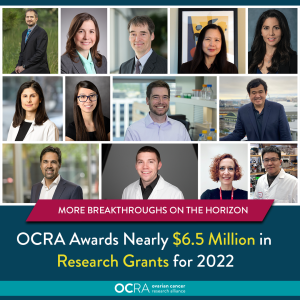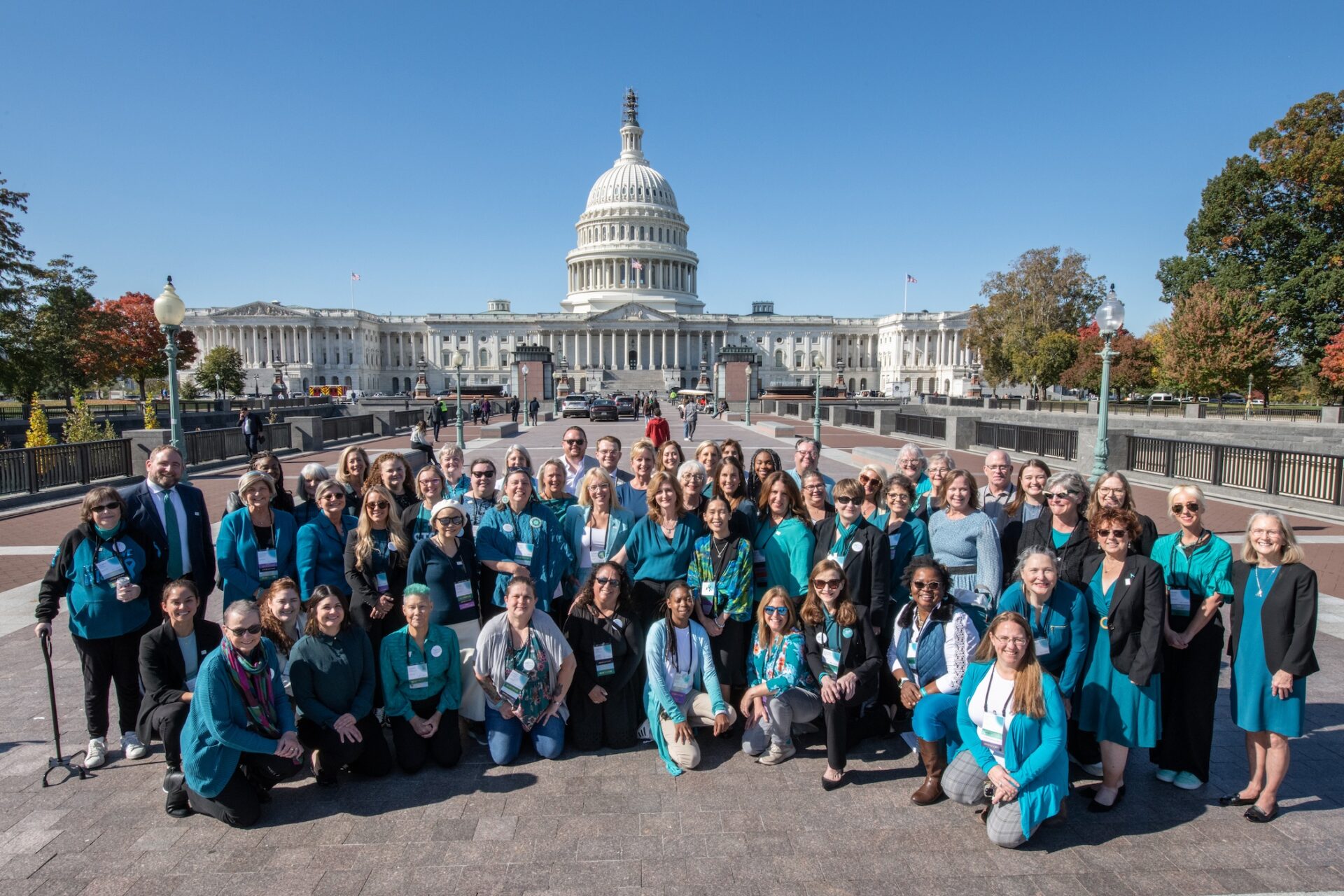
More breakthroughs are on the horizon, as OCRA has awarded grants to 22 dedicated scientists at 15 prestigious medical institutions to enable future ovarian cancer discoveries.
With this funding, OCRA grantees aim to answer questions that have vexed the scientific community, building on our collective knowledge and identifying new opportunities for ovarian cancer prevention and treatment.
These new projects target a range of important issues, reflecting the complexity of the disease — seeking more effective options for treating several types of ovarian cancer, including rare subtypes, and recurrent metastatic tumors that have become resistant to current therapies; exploring immunotherapy’s potential; investigating disease origins; working toward more personalized therapies; and harnessing cutting-edge technologies for molecular tumor profiling and data sharing, that can accelerate progress across the entire ovarian cancer field.
“OCRA is so pleased to fund this new and talented group of ovarian cancer researchers, whose groundbreaking ideas and commitment to ending this disease show extraordinary promise,” said Audra Moran, OCRA’s President & CEO.
“We are proud, and grateful, to support these dedicated scientists who are breaking new ground in the fight against ovarian cancer, and tackling some of the most critical challenges in treatment and care, to help more patients and families and bring us closer to a cure.”
Your support made these grants possible. We thank you, deeply, for standing with us and contributing toward our grants and programs that can change outcomes, and save lives.
We look forward to sharing more information on our grantees and their work, and reporting on discoveries all across the field, throughout the year.
Get to know our 2022 grantees and their innovative projects
Ann and Sol Schreiber Mentored Investigator Award Recipients
- Gamze Bildik Elcik, PhD, University of Texas M.D. Anderson Cancer Center, “DIRAS3 inhibits KRAS and sensitizes LGSOC cells to anti-autophagic therapy”
- Melica Brodeur, MD, Memorial Sloan Kettering Cancer Center, “Exploiting SMARCA4 alterations for new therapeutics in ovarian cancers”
- Patrick Innamarato, PhD, H. Lee Moffitt Cancer Center & Research Institute, Inc, “Determination of the immunogenic antigen repertoire in ovarian cancer”
- Benjamin Johnson, PhD, Van Andel Research Institute, “Ovarian Cancer Stem-like Cell Differentiation Trajectories in Single Cells”
- Thales Nepomuceno, PhD, H. Lee Moffitt Cancer Center & Research Institute, Inc., “Tackling PARPi sensitivity in HRP and HRD cells”
- Veethika Pandey, PhD, Perelman School of Medicine, University of Pennsylvania, “Overcoming T cell exhaustion in ovarian cancer tumor microenvironment”
- Pamela Rojas de Santiago, PhD, The Trustees of the University of Pennsylvania, “Investigating the therapeutic potential of CRABP2 in HGSOC”
- Amrita Salvi, PhD, The Board of Trustees of the University of Illinois – University of Illinois at Chicago, “Investigating the mechanism of action of PHY34 in HGSOC”
- Erin Wesley, PhD, Regents of the University of Minnesota – Twin Cities, “Impact of Cytomegalovirus and Inflammation on NK Cells in Ovarian Cancer”
- Imade Williams, PhD, Indiana University, “Targeting MYC-HSF1 co-Amplification in High Grade Serous Ovarian Cancer”
- Zelei Yang, PhD, Dana-Farber Cancer Institute, “Re-engaging the anti-tumor immune response against ovarian cancer”
Liz Tilberis Early Career Award Recipients
- Chi Lam Au Yeung, PhD, University of Texas M.D. Anderson Cancer Center, “Cancer-derived exosomal miRNAs modulate ovarian tumor microenvironment”
- Maria Victoria Botuyan, PhD, Mayo Clinic, “Probing how RAD18 and BARD1 antagonize 53BP1 in HR DNA repair”
- Lindsay Brubaker, MD, University of Colorado Denver, AMC and DC, “Targeting Chromobox 2 to overcome macrophage-induced immune suppression”
- Sammy Ferri-Borgogno, PhD, University of Texas M.D. Anderson Cancer Center, “BRCA-deficient ovarian cancer and IFITM3: a new “power couple”
- Livnat Jerby, PhD, Stanford University, “Targeting multifactorial immune evasion mechanisms in ovarian cancer”
- Jasmine Plummer, PhD, Cedars-Sinai Medical Center, “Chemopreventative targets in BRCA1 carrier models with P53 lesions” (Gail Baird Foundation Research Grant recipient)
- Haineng Xu, PhD, The Trustees of the University of Pennsylvania, “Strategies to exploit genetic alterations in clear-cell ovarian cancer”
Collaborative Research Development Grant Recipients
- Benjamin Bitler, PhD, University of Colorado Denver, AMC and DC, “A machine learning approach to chemotherapy-induced remodeling of the tumor”
- Ronald Buckanovich, MD, PhD, Magee-Womens Research Institute & Foundation, “Role of macrophage-secreted BIGH3 in tumor immunity”
- Jen-Tsan Chi, MD, PhD, Duke University School of Medicine, “The role of ferroptosis in the metastatic ovarian cancer”
- Sohrab Shah, PhD, Memorial Sloan Kettering Cancer Center, “Inferring mutational processes and patient stratification from standard-of-care clinical imaging” (in collaboration with Microsoft AI for Health)


